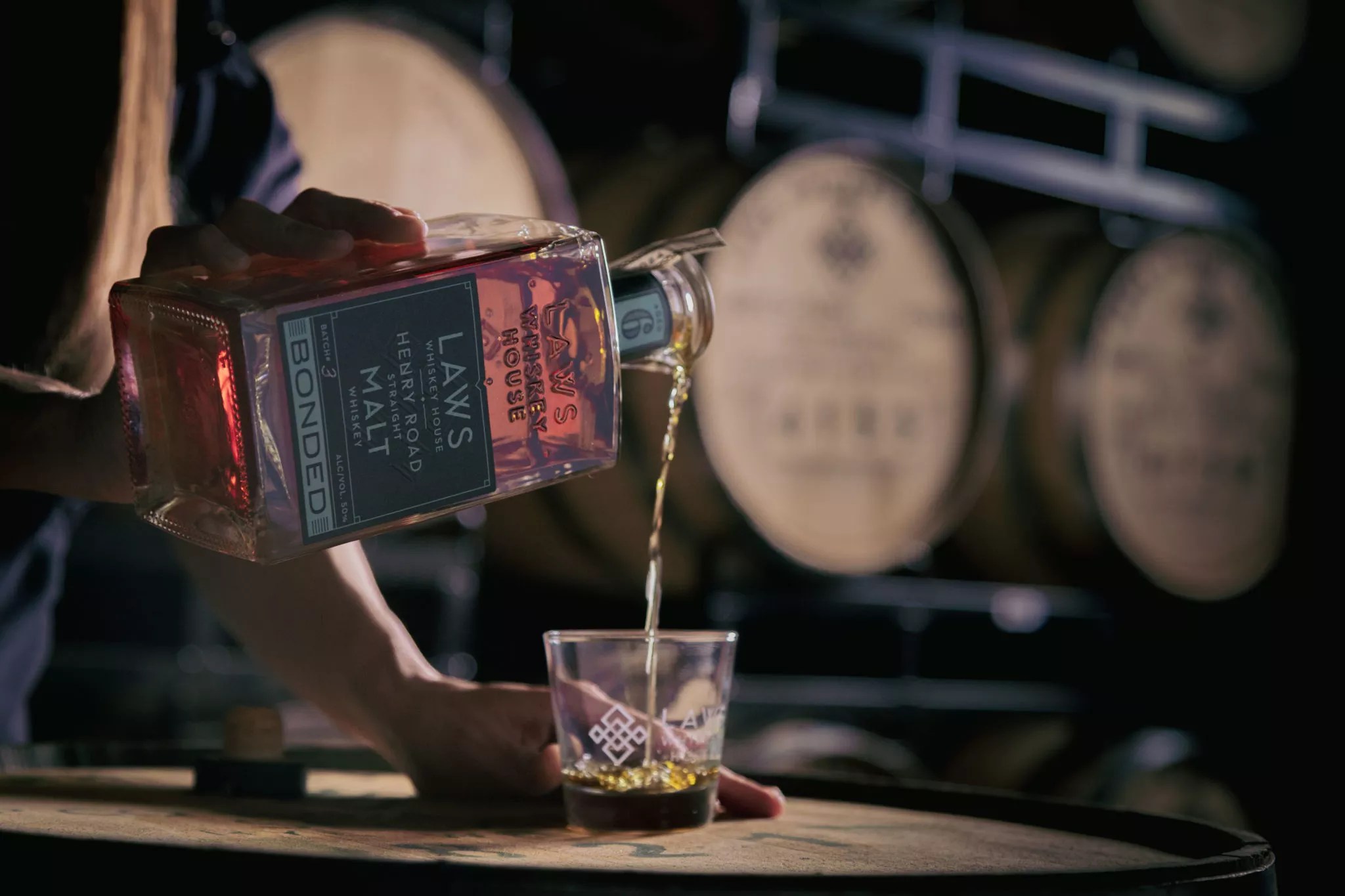
Laws Whiskey House

Audio By Carbonatix
While craft beer gets much of the attention in the local booze scene, Colorado-made spirits, particularly whiskey, have been raking in awards as the scene continues to mature.
Now, malt whiskey distillers in the state and across the country are celebrating the end of a years-long push to achieve federal recognition of a new style of whiskey: American single malt whiskey.
After being announced in the Federal Register in December, the new style designation went into effect on Sunday, January 19, giving domestic single-malt producers an official category and a space of their own. Formally known as a standard of identity, the new definition sets unique rules for single malt whiskey producers in the United States, who have had to deal with a lack of specificity in defining their product and an uphill battle to gain consumer recognition.
Lee Wood, co-founder of Wood’s High Mountain Distillery in Salida and president of the Colorado Distillers Guild, describes the change as a huge win for Colorado distillers. “There’s a lot more grains here that are grown beyond just corn,” he says. “A lot of people make bourbon, but compared to Kentucky and Tennessee, where it’s 99 percent corn, here it’s a much broader variety of grains and a lot of malt whiskey.”
In the past, Wood adds, liquor stores and bar owners didn’t know where to put domestic malt whiskies. “We didn’t go in the bourbon section, and we really don’t fit in the Scotch whiskey section. Hopefully this starts creating enough awareness amongst consumers and retailers about what to do with it,” he notes.
The style has long been better understood elsewhere in the world, while the American market often conflates whiskey and bourbon. “A lot of times it’s interchangeable,” Wood says. “When they’re thinking about whiskey, they’re thinking about bourbon. When they talk about whiskey, they’re talking about bourbon. The rest of the world, when they’re talking about whiskey, they’re talking about single malt.”
Boulder Spirits founder Alastair Brogan echoes the familiarity that other countries have with the style, noting that after Colorado, his biggest markets are Europe, Canada and South Africa, all beating out the other fifteen states where his whiskey is sold.
“With American single malt whiskey, it’s the education side of it,” Brogan says. “Americans are familiar with Scotch, and they’re familiar with American whiskies, but they’re not familiar with single malt. The Canadians, the South Africans, the Europeans are very in tune with that, but they’re not as in tune with what bourbons are, what ryes are, what wheat [whiskies] are.”

Stranahan’s has been producing single-malt whiskey in the Denver area for twenty years.
Stranahan’s Distillery
In Denver, Stranahan’s began distilling malt whiskey that fits the new designation twenty years ago, in 2004. As other craft distilleries around the country caught up to the idea, it encountered confusion among retailers and consumers, and a lack of specificity from the Alcohol and Tobacco Tax and Trade Bureau (TTB).
“Previously it was under the category of malt whiskey, and malt whiskey only has to be 51 percent barley,” Brogan notes.
After preliminary discussions in 2015, nine domestic single-malt whiskey producers formed the American Single Malt Whiskey Commission in 2016 to lobby the federal government to recognize single malt as a separate style – requiring 100 percent malted barley, distillation at a single U.S. distillery (rather than being a blend from multiple producers), and other criteria.
The commission and individual distilleries petitioned the TTB in 2017 to begin the process of creating a new style designation. The following year, the agency announced the beginning of the rulemaking process, which drew hundreds of comments, largely positive, in response.
The government released its proposed style rules in July 2022; those rules remained unchanged in the final announcement made late in 2024. American single malt whiskey is the first new designation recognized by the government in more than fifty years, when light whiskey was recognized in 1968 as whiskey distillers attempted to respond to the wave of popularity for vodka.

Stranahan’s produced a special blend in honor of the news.
Stranahan’s Distillery
Stranahan’s has produced a Founder’s Release blend to celebrate the new designation. Created by head blender Justin Aden and founder Jesse Graber, it clocks in at 120 proof and twelve years old. Through the end of January, visitors to the Stranahan’s distillery in Denver and its Aspen Whiskey Lodge can also enjoy a celebratory Designation Day Flight that includes four rare releases from the distillery’s library.
“They said we were crazy, and maybe we were, but we were believers in American single malt from the start,” Graber says. “Now, to see American single malt get the recognition and attention it deserves, all I can say is, it’s a very proud day.”
Al Laws, founder of Laws Whiskey House, says his team is excited to take part in the new style and is already planning future releases to celebrate and take advantage of ratification, building on the Henry Road Malt whiskey it has offered as a limited release in the past.
“We are thrilled about what this development means for the Colorado whiskey scene as a whole,” Laws says.
Brogan notes that the timing of the announcement wasn’t a good fit for Boulder Spirits to do a special release, adding that it caught the team by surprise. “It came as a bit of a shock, to be honest. We’ve been waiting for this day for so long, years, and then suddenly we get an email saying it’s been ratified,” he says. “This was an election year, and everyone went, ‘Ah, it’s not going to get done.'”
The new standard of identity may already be opening doors for Boulder Spirits, though. “Since this has been announced in December, we’ve been approached by three out-of-state distributors who said, ‘Hey, now that American single malt whiskey is official, could we have a discussion about your brand in our portfolio?'” he shares.
It’s an exciting place to start, but the new designation is only the beginning. Now, Brogan says, he and other distillers have to carry on their efforts to get the consumers up to speed. “It gives legitimacy, but now the work has got to begin again, or continue. It’s just education, education, education,” he concludes.